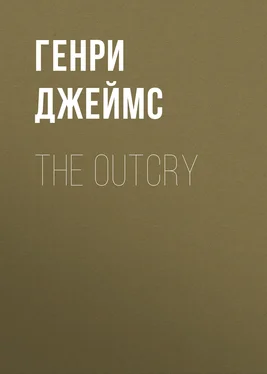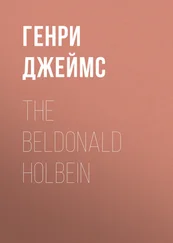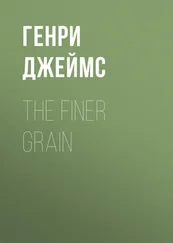Генри Джеймс - The Outcry
Здесь есть возможность читать онлайн «Генри Джеймс - The Outcry» — ознакомительный отрывок электронной книги совершенно бесплатно, а после прочтения отрывка купить полную версию. В некоторых случаях можно слушать аудио, скачать через торрент в формате fb2 и присутствует краткое содержание. Жанр: foreign_antique, foreign_home, visual_arts, на английском языке. Описание произведения, (предисловие) а так же отзывы посетителей доступны на портале библиотеки ЛибКат.
- Название:The Outcry
- Автор:
- Жанр:
- Год:неизвестен
- ISBN:нет данных
- Рейтинг книги:5 / 5. Голосов: 1
-
Избранное:Добавить в избранное
- Отзывы:
-
Ваша оценка:
- 100
- 1
- 2
- 3
- 4
- 5
The Outcry: краткое содержание, описание и аннотация
Предлагаем к чтению аннотацию, описание, краткое содержание или предисловие (зависит от того, что написал сам автор книги «The Outcry»). Если вы не нашли необходимую информацию о книге — напишите в комментариях, мы постараемся отыскать её.
The Outcry — читать онлайн ознакомительный отрывок
Ниже представлен текст книги, разбитый по страницам. Система сохранения места последней прочитанной страницы, позволяет с удобством читать онлайн бесплатно книгу «The Outcry», без необходимости каждый раз заново искать на чём Вы остановились. Поставьте закладку, и сможете в любой момент перейти на страницу, на которой закончили чтение.
Интервал:
Закладка:
“Bleak do you call it?” she laughed. “Why I found it, rather, tropical—‘lush.’ My neighbour on the other side wanted to talk to me of the White City.”
“Then you made it doubtless bleak for him , let us say. I couldn’t let you alone, I remember, about this —it was like a shipwrecked signal to a sail on the horizon.” “This” obviously meant for the young man exactly what surrounded him; he had begun, like Mr. Bender, to be conscious of a thick solicitation of the eye—and much more than he, doubtless, of a tug at the imagination; and he broke—characteristically, you would have been sure—into a great free gaiety of recognition.
“Oh, we’ve nothing particular in the hall,” Lady Grace amiably objected.
“Nothing, I see, but Claudes and Cuyps! I’m an ogre,” he said—“before a new and rare feast!”
She happily took up his figure. “Then won’t you begin—as a first course—with tea after your ride? If the other, that is—for there has been an ogre before you—has left any.”
“Some tea, with pleasure”—he looked all his longing; “though when you talk of a fellow-feaster I should have supposed that, on such a day as this especially, you’d find yourselves running a continuous table d’hôte .”
“Ah, we can’t work sports in our gallery and saloon—the banging or whacking and shoving amusements that are all most people care for; unless, perhaps,” Lady Grace went on, “your own peculiar one, as I understand you, of playing football with the old benighted traditions and attributions you everywhere meet: in fact I think you said the old idiotic superstitions.”
Hugh Crimble went more than half-way to meet this description of his fondest activity; he indeed even beckoned it on. “The names and stories and styles—the so often vain legend, not to be too invidious—of author or subject or school?” But he had a drop, no less, as from the sense of a cause sometimes lost. “Ah, that’s a game at which we all can play!”
“Though scarcely,” Lady Grace suggested, “at which we all can score.”
The words appeared indeed to take meaning from his growing impression of the place and its charm—of the number of objects, treasures of art, that pressed for appreciation of their importance. “Certainly,” he said, “no one can ever have scored much on sacred spots of this order—which express so the grand impunity of their pride, their claims, their assurance!”
“We’ve had great luck,” she granted—“as I’ve just been reminded; but ever since those terrible things you told me in town—about the tremendous tricks of the whirligig of time and the aesthetic fools’ paradise in which so many of us live—I’ve gone about with my heart in my mouth. Who knows that while I talk Mr. Bender mayn’t be pulling us to pieces?”
Hugh Crimble had a shudder of remembrance. “Mr. Bender?”
“The rich American who’s going round.”
It gave him a sharper shock. “The wretch who bagged Lady Lappington’s Longhi?”
Lady Grace showed surprise. “Is he a wretch?”
Her visitor but asked to be extravagant. “Rather—the scoundrel. He offered his infernal eight thousand down.”
“Oh, I thought you meant he had played some trick!”
“I wish he had—he could then have been collared.”
“Well,” Lady Grace peacefully smiled, “it’s no use his offering us eight thousand—or eighteen or even eighty!”
Hugh Crimble stared as at the odd superfluity of this reassurance, almost crude on exquisite lips and contradicting an imputation no one would have indecently made. “Gracious goodness, I hope not! The man surely doesn’t suppose you’d traffic.”
She might, while she still smiled at him, have been fairly enjoying the friendly horror she produced. “I don’t quite know what he supposes. But people have trafficked; people do; people are trafficking all round.”
“Ah,” Hugh Crimble cried, “that’s what deprives me of my rest and, as a lover of our vast and beneficent art-wealth, poisons my waking hours. That art-wealth is at the mercy of a leak there appears no means of stopping.” She had tapped a spring in him, clearly, and the consequent flood might almost at any moment become copious. “Precious things are going out of our distracted country at a quicker rate than the very quickest—a century and more ago—of their ever coming in.”
She was sharply struck, but was also unmistakably a person in whom stirred thought soon found connections and relations. “Well, I suppose our art-wealth came in—save for those awkward Elgin Marbles!—mainly by purchase too, didn’t it? We ourselves largely took it away from somewhere, didn’t we? We didn’t grow it all.”
“We grew some of the loveliest flowers—and on the whole to-day the most exposed.” He had been pulled up but for an instant. “Great Gainsboroughs and Sir Joshuas and Romneys and Sargents, great Turners and Constables and old Cromes and Brabazons, form, you’ll recognise, a vast garden in themselves. What have we ever for instance more successfully grown than your splendid ‘Duchess of Waterbridge’?”
The girl showed herself ready at once to recognise under his eloquence anything he would. “Yes—it’s our Sir Joshua, I believe, that Mr. Bender has proclaimed himself particularly ‘after.’”
It brought a cloud to her friend’s face. “Then he’ll be capable of anything.”
“Of anything, no doubt, but of making my father capable—! And you haven’t at any rate,” she said, “so much as seen the picture.”
“I beg your pardon—I saw it at the Guildhall three years ago; and am almost afraid of getting again, with a fresh sense of its beauty, a livelier sense of its danger.”
Lady Grace, however, was so far from fear that she could even afford pity. “Poor baffled Mr. Bender!”
“Oh, rich and confident Mr. Bender!” Crimble cried. “Once given his money, his confidence is a horrid engine in itself—there’s the rub! I dare say”—the young man saw it all—“he has brought his poisonous cheque.”
She gave it her less exasperated wonder. “One has heard of that, but only in the case of some particularly pushing dealer.”
“And Mr. Bender, to do him justice, isn’t a particularly pushing dealer?”
“No,” Lady Grace judiciously returned; “I think he’s not a dealer at all, but just what you a moment ago spoke of yourself as being.”
He gave a glance at his possibly wild recent past. “A fond true lover?”
“As we all were in our lucky time—when we rum-aged Italy and Spain.”
He appeared to recognise this complication—of Bender’s voracious integrity; but only to push it away. “Well, I don’t know whether the best lovers are, or ever were, the best buyers—but I feel to-day that they’re the best keepers.”
The breath of his emphasis blew, as her eyes showed, on the girl’s dimmer fire. “It’s as if it were suddenly in the air that you’ve brought us some light or some help—that you may do something really good for us.”
“Do you mean ‘mark down,’ as they say at the shops, all your greatest claims?”
His chord of sensibility had trembled all gratefully into derision, and not to seem to swagger he had put his possible virtue at its lowest. This she beautifully showed that she beautifully saw. “I dare say that if you did even that we should have to take it from you.”
“Then it may very well be,” he laughed back, “the reason why I feel, under my delightful, wonderful impression, a bit anxious and nervous and afraid.”
“That shows,” she returned, “that you suspect us of horrors hiding from justice, and that your natural kindness yet shrinks from handing us over!”
Читать дальшеИнтервал:
Закладка:
Похожие книги на «The Outcry»
Представляем Вашему вниманию похожие книги на «The Outcry» списком для выбора. Мы отобрали схожую по названию и смыслу литературу в надежде предоставить читателям больше вариантов отыскать новые, интересные, ещё непрочитанные произведения.
Обсуждение, отзывы о книге «The Outcry» и просто собственные мнения читателей. Оставьте ваши комментарии, напишите, что Вы думаете о произведении, его смысле или главных героях. Укажите что конкретно понравилось, а что нет, и почему Вы так считаете.












